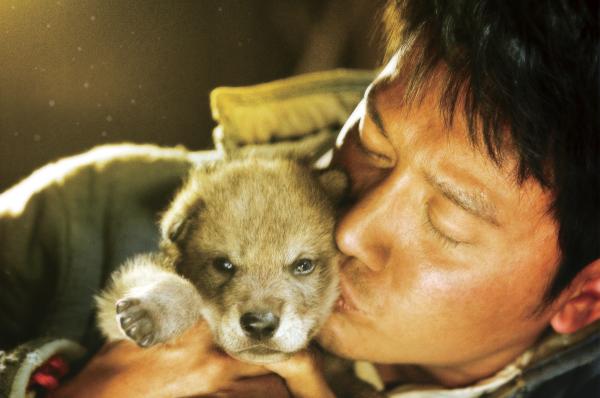
【電影簡介】
1967年,北京知青陳陣和楊克響應國家上山下鄉的號召,從北京來到了內蒙古額侖大草原插隊。在大草原上,他們結識了蒙古族牧民畢利格一家,也見識到了草原上最令人敬畏的動物:狼。在與狼群的接觸過程中,陳陣對這一物種有了強烈的興趣,甚至有了想自己養一只小狼的念頭。就在此時,一群外來人貪婪地掠奪了狼群儲存過冬的黃羊,打破了狼群和牧民之間的生態平衡。而以場部主任包順貴為首的生產隊員更是發起了一場滅狼運動,讓狼群和人類之間的關系陷入到了劍拔弩張的地步。
【音頻文本】
To think outside the box is an exceptional ability and one that few people can claim to possess. Just to capture an occasional spark of that creative enlightenment, we often have to break away from the confines of existing norms. For most Chinese and other descendants of agrarian societies, Lv Jiamin's semi-autobiographical novel "Wolf Totem", which he wrote in 2004 under the pseudonym Jiang Rong, was a real eye-opener about life on the Mongolian grasslands. Now a decade has passed, Jean-Jacques Annaud's film adaptation of the story once again warns us against the complacency that we might hold for our current way of living.
Like the original novel, the French director's adaptation is a eulogy to nomadic cultures. The lead character Chen Zhen is a student who is sent to the Inner Mongolian steppes for re-education in the 1960s. Whileliving among the nomads, the city boy observed (but failed to learn) the locals' respect for freedom and nature and became fascinated with the wolves, the agents of nature in nomadic belief.
The ancient Chinese literati liked to place themselves at the centre of a middle kingdom and always bragged about their cultural superiority as compared to the outlying barbarians. While they may have thrived in the affluence of a self-contained agrarian economy, they also missed out on the vitality and enterprise ofan open society. They were equally forgetful of the renewed strength that China obtained from each wave of"barbarian" invasions.
On the contrary, both the "Wolf Totem" novel and the film note and glorify a so-called pastoral lifestyle which contemplates everything in a circle of life and seeks to maintain a balance of all living things in the food chain. That means farming is not necessarily the best means of living, wolves are not necessarilya nuisance and their cunning, discipline and patience in their game of hunting represent the naturalist wisdom of a heavenly deity.
Exactly how much of the story reflects the true pastoral way of living or whether it is morally acceptableto glamorise such a killer instinct is open to debate, but as worldwide consumerism depletes the planet's resources at unprecedented rates, such a story does give us a perspective outside our usual line of thought to examine the issue of progress and sustainability. Ours should not be a debate about the superiority of nomadic or agrarian cultures, but whether and how we should save both from total annihilation in the wake of expanding consumerism and information industry. By depicting the free spirit of the wolves, Jean-Jacques Annaud is indeed directing our thinking capacity to study our current state from the perspective of anoutsider.
Annaud himself did the unthinkable by refusing to cast digital wolves. With the help of Scottish animal trainer Andrew Simpson, the crew have spent three years breeding three generations of Mongolian grassland wolves, until the animals are taught to run, sit, snarl and do all kinds of stunts people don't normally seeat the Cirque du Soleil. In the end, the "Wolf Totem" film contains the best of about a thousand shots of real wolves, their performance overshadow their Homo Sapien counterparts in the cast.
Actor Feng Shaofeng has made a bit of a name in recent years after his portrayal of several masculine characters. Although he always lacked the kind of subtlety required of a first-rate actor, he has done a good job at picking projects. In "Wolf Totem", his big, innocent eyes were perfect for the role of wolf-lover Chen Zhen, who neither quite understands the prudence of the Agrarian Han people, nor the naturalist wisdomof the grassland-roamers. His performance here is satisfactory, but to win top honours, he will have to think outside the box and pick more challenging roles in the future.
So in conclusion, "Wolf Totem" is an unconventional movie with strong philosophical and artistic value. Itis a story of wolves that kills at the very beginning of the Chinese year of sheep.
輕松調頻EZFM 微信mrweekly











